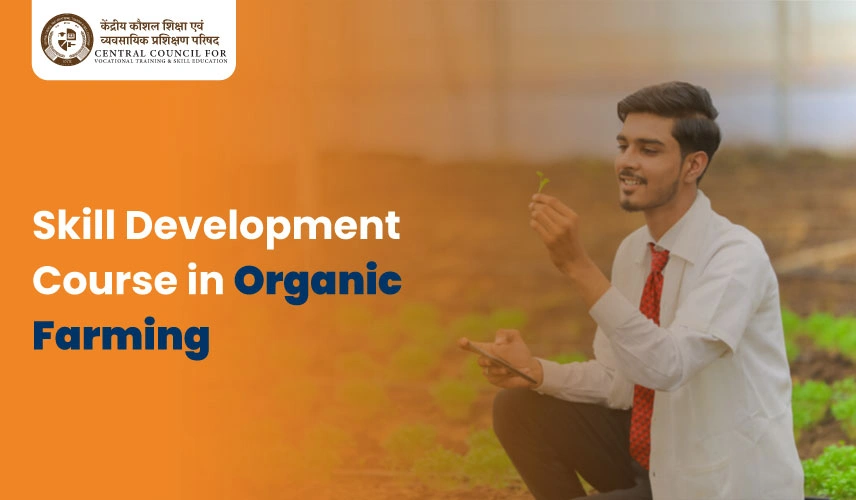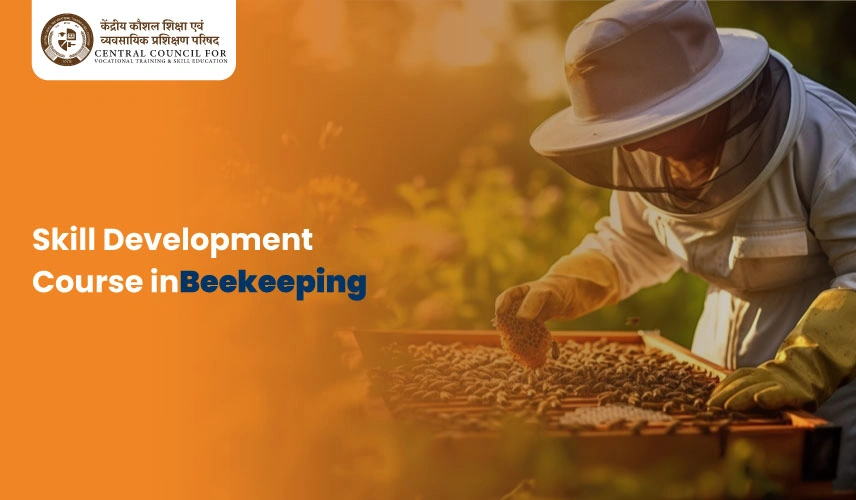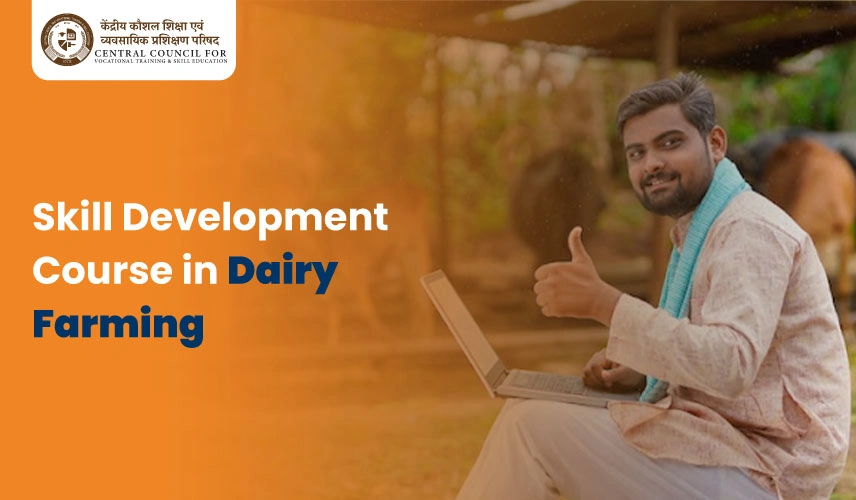- +91 8595350621
- info@ccvte.org
- C4/97B, Keshav Puram, Delhi-110035
Organic Farming

Skill Development Program in Organic Farming
Organic farming is an agricultural method that emphasizes the use of natural processes and materials to cultivate crops and raise livestock. It avoids synthetic chemicals, such as pesticides and fertilizers, focusing instead on techniques like composting, crop rotation, and biological pest control. Organic farming aims to maintain soil health, enhance biodiversity, and reduce environmental impact, promoting sustainability and ecological balance. This approach relies on organic inputs, such as manure and plant-based compost, and practices that support natural ecosystems. By fostering a harmonious relationship between plants, animals, and the environment, organic farming seeks to produce food that is healthier for consumers and the planet. With increasing consumer demand for organic products, this method offers a viable and eco-friendly alternative to conventional agriculture. Organic farming also emphasizes the importance of maintaining and improving soil health. Practices such as green manuring, cover cropping, and reduced tillage are employed to enhance soil structure and fertility, which helps in retaining moisture and reducing erosion. By avoiding synthetic chemicals and promoting organic matter, organic farming fosters a rich microbial ecosystem in the soil that supports plant growth and resilience. Additionally, organic farming contributes to biodiversity conservation by creating habitats for a variety of organisms, from beneficial insects to birds. This diversity helps in natural pest control and reduces the need for chemical interventions.
Why did you choose the Organic Farming Program from CCVTE?
- A skill development course in Organic Farming is designed for individuals aspiring to pursue a career in sustainable agriculture and environmental stewardship.
- The course equips students with practical skills and knowledge necessary for effective organic farming practices.
- Upon completion, graduates can explore opportunities in organic farms, agricultural consulting, and environmental organizations.
- Key highlights of the course include its flexibility and affordability, allowing students to complete it more efficiently and at a lower cost compared to traditional full-time programs.
- The curriculum covers essential topics such as soil health, crop rotation, pest management, and sustainable farming techniques.
- This training provides a practical, cost-effective pathway to a successful career in organic agriculture.
- The Organic Farming course also emphasizes hands-on experience, providing students with practical training in real-world farm settings.
- Students learn to apply organic methods in soil management, pest control, and crop cultivation, gaining valuable insights into sustainable practices.
Specializations in Organic Farming
- Soil Health Management
- Organic Pest and Disease Control
- Crop Rotation and Diversity
- Composting and Organic Fertilizers
- Sustainable Crop Production
- Organic Livestock Management
- Agroforestry and Permaculture
- Certified Organic Systems
- Organic Certification and Compliance
- Biodiversity and Ecosystem Management
Career Opportunities
Career opportunities in organic farming are diverse and growing, reflecting the increasing demand for sustainable agricultural practices. Professionals in this field can work as organic farm managers, overseeing the production of crops and livestock while implementing eco-friendly practices.
Other roles include soil health specialists, who focus on maintaining and enhancing soil fertility, and pest management experts, who develop natural methods to control agricultural pests. With the rise in consumer demand for organic products, there are also prospects in marketing and selling organic produce, as well as in educating and advocating for sustainable agriculture practices.
- Organic Farm Manager
- Soil Health Specialist
- Pest and Disease Management Consultant
- Organic Certification Consultant
- Agroecologist
- Organic Crop Producer
- Livestock Manager (Organic)
- Sustainable Agriculture Researcher
- Marketing and Sales for Organic Products
- Educational and Outreach Coordinator
Syllabus
|
3 Month |
6 Month |
1 Year |
2 Years |
|
Introduction to Organic Farming |
Introduction to Organic Farming |
Introduction to Organic Farming |
Introduction to Organic Farming |
|
Soil Health and Management |
Soil Health and Management |
Soil Health and Management |
Soil Health and Management |
|
Organic Crop Production |
Organic Crop Production |
Organic Crop Production |
Organic Crop Production |
|
Organic Fertilization Techniques |
Pest and Disease Management |
Pest and Disease Management |
Pest and Disease Management |
|
Organic Fertilization Techniques |
Organic Fertilization Techniques |
Organic Fertilization Techniques |
|
|
Organic Farming Practices |
Organic Farming Practices |
Organic Farming Practices |
|
|
Organic Animal Husbandry |
Organic Animal Husbandry |
Organic Animal Husbandry |
|
|
Advanced Organic Animal Husbandry |
Advanced Organic Animal Husbandry |
Advanced Organic Animal Husbandry |
|
|
Organic Farm Management |
Organic Farm Management |
||
|
Marketing Organic Products |
Marketing Organic Products |
||
|
Advanced Organic Farming Techniques |
Advanced Organic Farming Techniques |
||
|
Sustainable Agricultural Practices |
Sustainable Agricultural Practices |
||
|
Organic Farm Equipment and Technology |
|||
|
Organic Farming in Different Environments |
|||
|
Practical Organic Farming Skills |
|||
|
Research and Innovation in Organic Farming |
Top Hiring Opportunities in Organic Farming
- Organic Farms and Cooperatives
- Sustainable Agriculture Research Institutions
- Organic Certification Bodies
- Agroecology and Environmental NGOs
- Government Agricultural Agencies
- Organic Food Processing Companies
- Farm Equipment Manufacturers and Suppliers
- Educational Institutions and Extension Services
- Organic Produce Retailers and Distributors
- Consulting Firms
Other Paramedical Courses Provided by CCVTE
Frequently Asked Questions
Organic farming is a method of agriculture that focuses on growing crops and raising animals without synthetic chemicals, pesticides, or genetically modified organisms (GMOs). It emphasizes sustainability, soil health, and biodiversity.
Courses typically cover soil management, pest and disease control, crop rotation, organic certification standards, composting, and sustainable farming practices.
Prerequisites vary by program but generally include a basic understanding of agriculture or biology. Some programs may require prior experience or education in related fields.
Graduates can pursue careers as organic farmers, agricultural consultants, farm managers, sustainability coordinators, or work in agricultural research and development.
Many programs include practical components, such as fieldwork, lab sessions, or internships, to provide hands-on experience in organic farming techniques.



